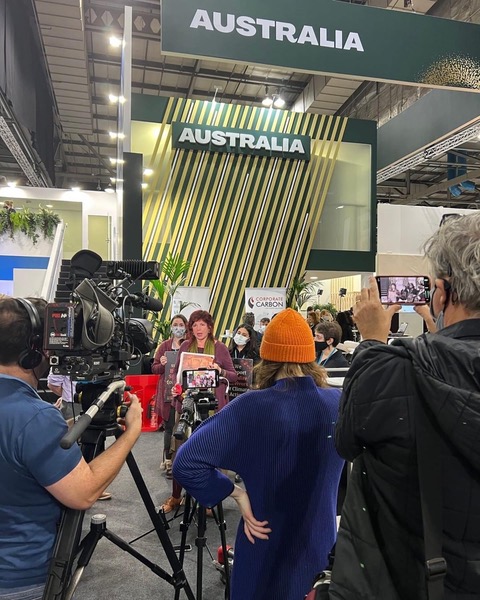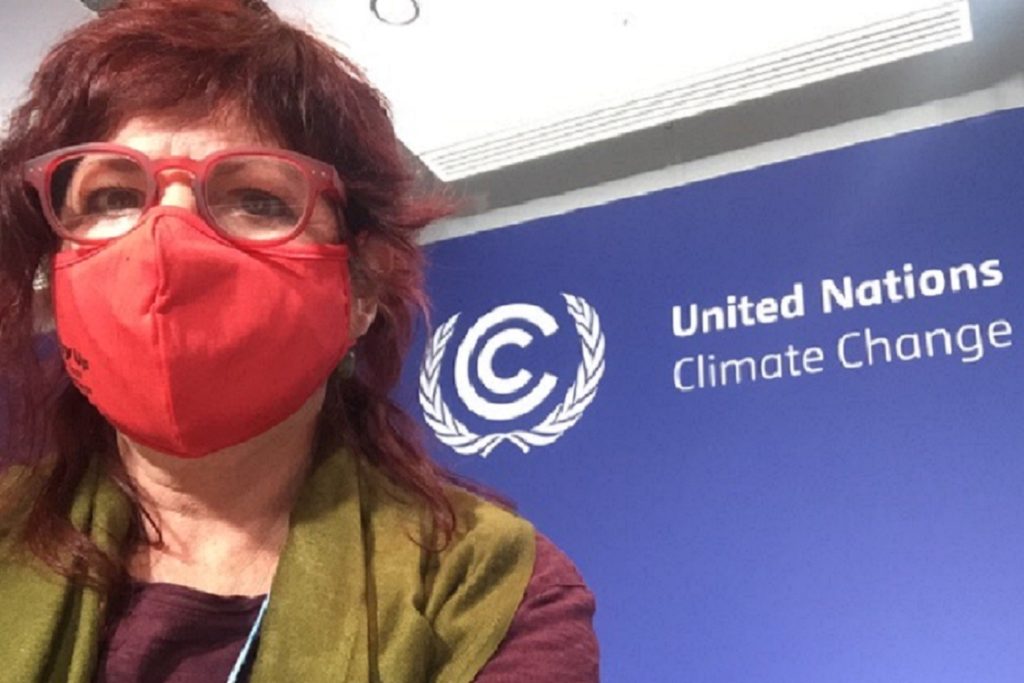Jo Dodds watched a bushfire burn through her south coast NSW township and impact her own home on March 18, 2018. It was an event that made her realise the most critical issue she could address as a human and as a community representative was climate destruction.
Since then, Dodds has worked tirelessly as the President of Bushfire Survivors for Climate Action (BSCA), a group of bushfire survivors, firefighters and local councillors working together to demand the Australian government take action on climate change.
She was named the Emerging Leader in Climate Action at the 2021 Women’s Agenda Leadership Awards for her efforts to change the conversation around climate, through powerful stories from individual Australians that remove the distraction of political disputes.
Dodds is optimistic that climate change is becoming a cross-partisan issue and now being seen more widely as an urgent concern. Most of her focus with BSCA over the past year has been on the federal election and working in key bushfire-affected seats to make climate action a top three issue in the minds of voters. BSCA is a politically agnostic group and Dodds believes the outcome of the election speaks for itself, but she notes that conservative candidates who spoke out strongly on the need for climate action were in many cases able to buck the trend away from the Liberal National Party.
Below, we catch up with the winner of the Women’s Agenda Leadership Award, just as we’re again calling on nominations for the 2022 Emerging Leader on Climate Action (as well as all our 2022 award categories). Nominations close in August.
Dodds shares an update on the important work she’s been doing over the past year with BSCA and her attendance at the United Nations climate change conference (COP26) in Glasgow since the Women’s Agenda Leadership Awards.
She also notes why climate change is such an important issue for women, and gives some valuable advice for making big things happen.
“Women are impacted far more severely by climate damage – we are more likely to be in insecure work and lose income during disasters. Women are more vulnerable to housing insecurity as a result, she says. “And we’re often the ones trying to keep family together through the hard times.”
Dodds notes the role women play in the recovery efforts following disasters, including by connecting and supporting communities — work that is so often overlooked while the more “visible” infrastructure projects get the “funding and ribbon-cutting”.
“We need to get a lot better at recognising, honouring and supporting the work women are doing, as volunteers in CWA, in community-led recovery organising. And this way we’ll also be better at identifying the needs in those same communities, of all impacted people.
“Then I go to climate conferences or zoom calls and it’s predominantly women working in the climate action space. I’m sure many of us could earn a lot more money in other sectors but we’re here, doing the big stuff, because it’s so important.”

Through your work with Bushfire Survivors for Climate Action, what do you see as being the current most important action needed to support bushfire survivors?
The current most important action needed to support bushfire survivors remains the need to reduce greenhouse gas emissions now. We are watching in sorrow as communities in northern NSW deal with repeat flooding events, each one breaking new records. People everywhere are exhausted. They’re trying to keep their families safe, fed, warm and dry but the next climate disasters are rolling towards us. It’s a case of needing more than recovery measures from our governments – we desperately need to address the cause of these disasters or we’ll see even worse situations all too soon.
How would you describe your current role and job?
It’s a split role. I’m responsible for leading a small staff team working on a very diverse range of projects. With that comes attention to governance and finance, fundraising, working with our board.
But I also face outwards, as a representative of our organisation, as a person with lived experience of climate disasters. This is the work I really love! I get to hear the most incredible stories of survival, of individual courage, fear, strength, as I share mine. And these stories, from people across the world, fuel my passion to keep working on climate action. There’s just this incredible array of defining moments of loss and trauma and also deep, active hope and compassion, that I’ve had the privilege of ‘witnessing’. And they absolutely drive me forward when things are tough.
What’s your career and life been like over the past year?
Haha! I always joke that ‘career’ applies to me more in the sense of careen and crash, than of a strategic advancement of vocational interests! But in just 12 months I’ve seen BSCA grow from a purely volunteer driven organisation to having four paid employees.
With the backing of my community and the climate network I was able to attend COP26 in Scotland and take Australia’s abysmal record on climate action to a world audience.
We also won our case in the NSW Land and Environment Court against the NSW EPA, and had the win supported by the then Environment Minister, Matt Kean.
My life has been very focused on these missions over the past year – with the odd break to go camping in our glorious National Parks with friends.

Can you tell us about a project you’ve been working on over the past year that you’re really excited about?
One of our major goals has been to shift the conversation about climate into the mainstream. That meant bringing more conservative voices into the space, taking the bitter politics out of it. We knew that placing the people who are bearing the brunt of climate impacts at the centre of conversations about climate action would be a circuit breaker.
No one can ignore the horrors we’ve seen over the 2019-2020 “Black Summer” fires, the families who are still living in temporary accommodation – tents, caravans. And the toll on relationships and mental health has been phenomenal. By highlighting this at every opportunity I think we’ve had a big impact on bringing climate into polite conversation.
And now the next stage – of acting quickly enough to stop catastrophic warming – is possible.
What advice do you have for women who are looking to push the status quo on trying to achieve better outcomes for others?
Be united! Support other women doing similar work. At critical moments just a phone call or email recognising someone else’s struggle, is incredibly uplifting. So many of us are working in isolation now and that is hard. We need to make time to actually gather – in covid-safe ways, of course – and be more to each other than zoom-faces. I’m always so uplifted by the generosity of smart, skilled, wise women who’ve helped me get through the tough patches. And I try to be that for others.
What, generally, is your best career tip for making big things happen?
Hmmm, I have to say, a big one for me is to go with my gut. I still take a ton of advice, and I wrestle with doubts all the time, but every now and then I step back, look at the big picture and see that there are opportunities and moments when a bold action can make a difference. We are in a historical moment of opportunity to improve or destroy the lives of billions of beings. That’s worth taking a risk on. Have courage – do the big scary thing – even when you’re not sure where it will land. You can always apologise later.


